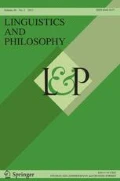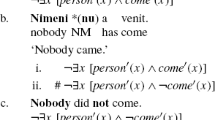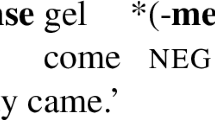Abstract
This paper addresses the two interpretations that a combination ofnegative indefinites can get in concord languages like French:a concord reading, which amounts to a single negation, and a doublenegation reading. We develop an analysis within a polyadic framework,where a sequence of negative indefinites can be interpreted as aniteration of quantifiers or via resumption. The first option leadsto a scopal relation, interpreted as double negation. The secondoption leads to the construction of a polyadic negative quantifiercorresponding to the concord reading. Given that sentential negationparticipates in negative concord, we develop an extension of thepolyadic approach which can deal with non-variable binding operators,treating the contribution of negation in a concord context assemantically empty. Our semantic analysis, incorporated into agrammatical analysis formulated in HPSG, crucially relies on theassumption that quantifiers can be combined in more than one wayupon retrieval from the quantifier store. We also considercross-linguistic variation regarding the participation ofsentential negation in negative concord.
Similar content being viewed by others
REFERENCES
Abeillé, Anne and Danièle Godard: 1997, ‘The Syntax of French Negative Adverbs’, in Paul Hirschbuhler and F. Martineau (eds), Negation and Polarity: Syntax and Semantics, John Benjamins, Amsterdam, pp. 1–27.
Barwise, Jon and Robin Cooper: 1981, ‘Generalized Quantifiers and Natural Language’ Linguistics and Philosophy 4, 159–219.
Beghelli, Filippo and Tim Stowell: 1997, ‘Distributivity and Negation: The Syntax of Each and Every’ in Anna Szabolcsi (ed.), Ways of Scope Taking, Kluwer Academic Press, Dordrecht, pp. 71–197.
van Benthem, Johan: 1986, Essays in Logical Semantics, Reidel, Dordrecht.
van Benthem, Johan: 1989, ‘Polyadic Quantifiers’ Linguistics and Philosophy 12, 437–464.
Bouma, Gosse, Robert Malouf, and Ivan A. Sag: 2001, ‘Satisfying Constraints on Extraction and Adjunction, Parts I and II’ Natural Language and Linguistic Theory 19(1), 1–65.
Cooper, Robin: 1983, Quantification and Syntactic Theory, Reidel, Dordrecht.
Corblin, Francis: 1996, ‘Multiple Negation Processing in Natural Language’ Theoria 17, 214–259.
Corblin, Francis and Ivan Derzhansky: 1997, ‘Multiple Negation, Optional Arguments and the Reification of Eventualities’, in Francis Corblin, Danièle Godard and Jean-Marie Marandin (eds.), Empirical Issues in Formal Syntax and Semantics, Peter Lang, Bern.
Davis, Anthony: 2001, Linking by Types in the Hierarchical Lexicon, CSLI Publications, Stanford.
Déprez, Viviane: 1997, ‘Two Types of Negative Concord’ Probus 9, 103–143.
Déprez, Viviane: 2000, ‘Parallel (A)symmetries and the Internal Structure of Negative Expressions’ Natural Language and Linguistic Theory 18, 253–342.
Farkas, Donka and Anastasia Giannikidou: 1995, ‘How Clause-Bounded is the Scope of Universals’ Proceedings of SALT VI, Cornell University, Ithaca, NY, pp. 35–52.
Giannikidou, Anastasia: 1998, Polarity Sensitivity as (Non)Veridical Dependency, John Benjamins, Amsterdam.
Giannikidou, Anastasia: 2000, ‘Negative ...concord’, Natural Language and Linguistic Theory 18, 457–523.
Ginzburg, Jonathan and Ivan A. Sag: 2000, English Interrogative Constructions, CSLI Publications, Stanford.
Grevisse, Maurice: 1993, Le Bon Usage (13th revised edition), Duculot, Paris.
Haegeman, Liliane: 1995, The Syntax of Negation, Cambridge University Press, Cambridge.
Haegeman, Liliane and Rafaella Zanuttini: 1996, ‘Negative Concord in West Flemish’ in Andrea Belletti and Luigi Rizzi (eds.), Parameters and Functional Heads, Oxford University Press, Oxford, pp. 117–179.
Higginbotham, James and Robert May: 1981, ‘Questions, Quantifiers and Crossing’ The Linguistic Review 1, 41–79.
Jespersen, Otto: 1917, ‘Negation in English and Other Languages’ Reprinted in Selected Writings of Otto Jespersen (1962), George Allen and Unwin, London, pp. 3–151.
Jones, Michael Allan: 1993, Sardinian Syntax, Routledge, London.
Kasper, Robert: ????, ‘The Semantics of Recursive Modification’ unpublished manuscript, Ohio State University.
Kayne, Richard: 1981, ‘ECP-Extensions’ Linguistic Inquiry 12, 349–371.
Keenan, Edward: 1987, ‘Unreducible n-ary Quantifiers in Natural Language’ in Peter Gärdenfors (ed.), Generalized Quantifiers, Reidel, Dordrecht, pp. 109–150.
Keenan, Edward: 1992, ‘Beyond the Frege Boundary’, Linguistics and Philosophy 15, 199–221.
Keenan, Edward and Dag Westerståhl: 1997, ‘Generalized Quantifiers in Linguistics and Logic’, in Johan van Benthem and Alice ter Meulen (eds.), Handbook of Logic and Language, Elsevier, Amsterdam, pp. 837–893.
Kim, Jongbok and Ivan A. Sag: 1995, ‘The Parametric Variation of English and French Negation’ in Proceedings of the Fourteenth Annual Meeting of the West Coast Conference on Formal Linguistics, CSLI Publications, Stanford, pp. 303–317.
Kim, Jongbok and Ivan A. Sag: in press, ‘Negation without Head Movement’ Natural Language and Linguistic Theory.
Ladusaw, William: 1992, ‘Expressing Negation’ Proceedings of SALT 2, The Ohio State University, Columbus, pp. 237–259.
Laka Mugarza, Itziar: 1990, Negation in Syntax, Doctoral dissertation, MIT.
Laka Mugarza, Itziar: 1993, ‘Negative Fronting in Romance’ in William Ashby (ed.), Linguistic Perspectives on the Romance, John Benjamins, Amsterdam, pp. 315–333.
Lindström, P.: 1966, ‘First Order Predicate Logic with Generalized Quantifiers’ Theoria 35: 1–11.
Liu, F.-H.: 1990, Scope Dependency in English and Chinese, Doctoral dissertation, University of California at Los Angeles.
Manning, Christopher and Ivan A. Sag: 1998, ‘Argument Structure, Valence, and Binding’ Nordic Journal of Linguistics 21, 107–144.
Manning, Christopher, Ivan A. Sag, and Masayo Iida: 1999, ‘The Lexical Integrity of Japanese Causatives’ in Robert Levine and Georgia Green (eds.), Readings in Modern Phrase Structure Grammar, Cambridge University Press, pp. 39–70.
May, Robert: 1989, ‘Interpreting Logical Form’ Linguistics and Philosophy 12, 387–435.
Moltmann, Friederike: 1995, ‘Exception Sentences and Polyadic Quantification’ Linguistics and Philosophy 18, 223–280.
Moltmann, Friederike: 1996, ‘Resumptive Quantifiers in Exception Sentences’ in Makoto Kanazawa, Chris Piñón, and Henriëtte de Swart (eds.), Quantifiers, Deduction, and Context, CSLI Publications, Stanford, pp. 139–170.
Muller, Claude: 1991, La Négation en Français, Droz, Genève.
Pollard, Carl and Ivan A. Sag: 1994, Head-Driven Phrase Structure Grammar, University of Chicago Press, Chicago and CSLI Publications, Stanford.
Pollard, Carl and Eun Jung Yoo: 1998, ‘A Unified Theory of Scope for Quantifiers and wh-Phrases’ Journal of Linguistics.
Przepiórkowski, Adam: 1999, Case Assignment and the Complement-Adjunct Dichotomy: A Non-Configurational Constraint-Based Approach, Doctoral dissertation, Universität Tübingen, Germany.
Przepiórkowski, Adam and Anna Kupść: 1999, ‘Eventuality Negation and Negative Concord in Polish and Italian’ in R. Borsley and A. Przepiórkowski (eds.), Slavic in HPSG, Stanford: CSLI Publications.
Richter, Frank and Manfred Sailer: 1999, ‘A Lexicalist Collocation Analysis of Sentential Negation and Negative Concord in French’ Arbeitspapiere des SFB 340, Universität Tübingen, Germany.
Sag, Ivan A. and Thomas Wasow: 1999, Syntactic Theory: A Formal Introduction, CSLI Publications, Stanford. Distributed by Cambridge University Press.
de Swart, Henriëtte: 1998, ‘La Position de ni dans le système de la négation’ in Denis Delfitto, Jan Schroten, and Henriëtte de Swart (eds.), Recherches de Linguistique Française et Romane, Vol. 17, UiL-OTS/Romance Languages, Utrecht, pp. 67–80.
de Swart, Henriëtte: 1998, ‘Licensing of Negative Polarity Items under Inverse Scope’ Lingua 105, 175–200.
de Swart, Henriëtte: 2001, ‘Négation et coordination: la conjonction ni’, in Reineke Bok-Bennema, Bob de Jonge, Brigitte Kampers-Manhe, and Arie Molendijk (eds.), Adverbial Modification, Rodopi, Amsterdam, pp. 109–124.
Szabolcsi, Anna: 1997, ‘Strategies for Scope Taking’ in Anna Szabolcsi (ed.), Ways of Scope Taking, Kluwer Academic Press, Dordrecht, pp. 109–154.
Vallduví Enric: 1994, ‘Polarity items, n-Words and Minimizers in Catalan and Spanish’ Probus 6, 263–294.
Westerståhl, Dag: 1989, ‘Quantifiers in Formal and Natural Languages’ in Dov Gabbay and Frantz Guenthner (eds.), Handbook of Philosophical Logic, Vol. 4, Reidel, Dordrecht, pp. 1–131.
Van der Wouden, Ton: 1997, Negative Contexts. Collocation, Polarity and Multiple Negation, Routledge, London.
Van der Wouden, Ton and Frans Zwarts: 1993, ‘A Semantic Analysis of Negative Concord’ Proceedings of SALT 3, Department of Linguistics, Cornell University, Ithaca.
van der Wouden, Ton: 1994, Negative Contexts, Doctoral dissertation, University of Groningen.
Warner, Anthony: 1993, English Auxiliaries: Structure and History, Cambridge University Press, Cambridge and New York.
Warner, Anthony: 2000, ‘English Auxiliaries without Lexical Rules’ in Robert Borsley (ed.), Syntax and Semantics 32: The Nature and Function of Syntactic Categories, Academic Press, San Diego and London, pp. 167–220.
Zanuttini, Rafaella: 1991, Syntactic Properties of Sentential Negation, Doctoral dissertaton, University of Pennsylvania.
Author information
Authors and Affiliations
Rights and permissions
About this article
Cite this article
De Swart, H., Sag, I.A. Negation And Negative Concord In Romance. Linguistics and Philosophy 25, 373–417 (2002). https://doi.org/10.1023/A:1020823106639
Issue Date:
DOI: https://doi.org/10.1023/A:1020823106639




